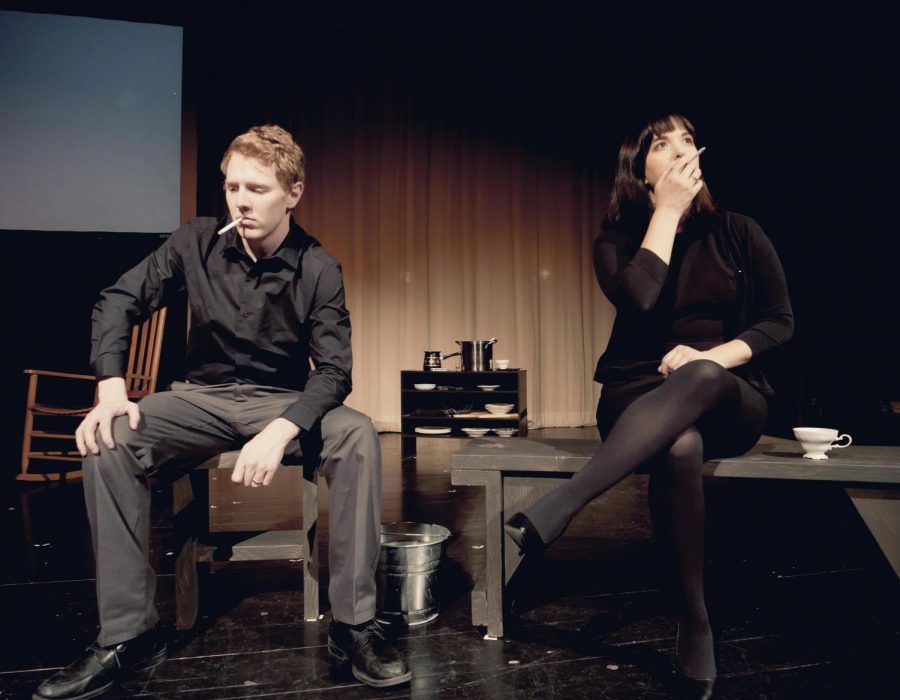‘Neighbor’ play features excellent acting
The original play “Live Thy Neighbor” premiered this past weekend at UNI. There were performances March 1, 2, 3 at 7:30 p.m. in the Interpreter’s Theatre in Lang Hall.
Mar 5, 2018
Neighbors: they park in the wrong spot, play their music too loudly and have elephant feet. Despite this, do we have an obligation to know and love our neighbors?
“Live Thy Neighbor,” written and directed by Milica Njezic, a graduate student in the Communications Studies Department, analyzes these questions. The play explored the act of neighboring, debating the differences in the act in collectivist and individualist cultures — specifically, Bosnia and Serbia compared to the United States.
“Live Thy Neighbor” consisted of six scenes, with the whole show lasting a little over an hour. Consequently, scenes were concise, and the audience was never left lethargic.
Each scene was different: the first and last scenes featured Njezic and two friends discussing neighboring, including debating checking on their own neighbors after hearing a series of loud thumps. Another scene centered around a married couple who are Bosnian refugees living in Waterloo. Two other scenes featured Njezic’s life growing up, at which point audience members encountered Misho, a particularly bad neighbor.
These scenes contained the most bumps. Introducing expletive language and giving historical context is always difficult, and the writing felt forced to give an accurate historical synopsis while remaining within the characters’ personalities and dialogue. Consequently, parts of the dialogue felt stilted and unnatural. These scenes could have benefitted from the “less is more” idea.
There were, however, many unique elements that shined through. In one scene, Njezic and friends visit the aforementioned Bosnian refugees in Waterloo. Njezic asks the couple about their experience coming to the United States with empty pockets and no English proficiency. Instead of answering the question through typical dialogue, the married couple cut to a bit in which they are newscasters for Fox 28 News. They report on the influx of Bosnian refugees and their need for inclusion and assimilation in the community. The bit was quick, seamless and refreshing.
In this same scene, the couple talk about life in Bosnia, discussing how neighbors ate, drank, worked, laughed and loved together. Men went to the field and women cooked together while they were out. When the men returned, everyone sang, danced and ate together, creating a deep fellowship.
The writing could have felt trite and idealistic here, but Njezic’s creative vision turned the scene on its head. As soon as the couple finished their thought on how they long to sing and dance with their neighbors again, Bosnian music came through the speakers loudly, and all the actors spilled onto the stage to perform a dance in sequence. Men had field tools, women had whisks and bowls and the song was led by a strong beat — it got the job done.
The acting was flawless. Actors who took on Bosnian accents did an excellent job, and those who could not, did not. The writing provided personalities in its own way, but the actors showed a level of immersion and practice with their characters that writing cannot accomplish.
Take Misho, played by Cole Fox. Misho is Njezic’s “bad” neighbor: he smokes, drinks, uses foul language and is an a–hole. Fox wholly embodied this character with his raspy voice, heavy eyes and cutting delivery of lines. In another scene, Misho experiences remorse for being a bad neighbor when his neighbors surround him with love after his daughter takes her life. Misho has a brief monologue in which he poetically talks about how his neighbors have given him a shoulder to cry on, and their shoulders are “soaked in [my] shame and regret.”
He later apologizes to Njezic for being an awful man when she was growing up. Here, Fox played the part perfectly: he maintained the character that is rough around the edges while giving him vulnerability. He did not change the core of the character to show the emotion the writing demanded.
Other actors cannot be forgotten. Eleven excellent performers embraced living, breathing people. Their embodiment of different personalities was exemplary. Each character was unique, as were the actors. Individuals played the roles of lively and goofy friends, somber and troubled neighbors, loving and affectionate couples, and stressed students — all with finesse.
As for the more technical aspects, the play would have benefitted from a more seamless transition between scenes. While I understand the need for rearranging, there was a level of clunkiness that made transitions distracting.
The writing in “Live Thy Neighbor” proved to be concise and largely well done. The script was full of beautiful one-liners that brought shivers down the spine. At the same time, Njezic’s writing remained upbeat and light, with conversations featuring natural jokes and relevant pop culture references from different time periods.
Between scenes, the voice of Njezic or an interviewee came over the speakers to provide a brief poem to re-center the play for the next scene, which was often a different place and time from the previous scene. These poems were exquisite, and the voice reading them was inviting and captivating.
Njezic managed to discuss the importance of being a good neighbor (and person) even when others are not “deserving.” Her writing addressed God’s role in neighboring through the eye of a Serbian or Bosnian, war’s impact on relationships, death (including suicide and grieving), Slavic culture (including cooking and music), politics in the United States and being mindful and present in one’s interactions.
All these themes were blended together to create an inspiring play that made me want to knock on my neighbors’ door and say hello… almost.








